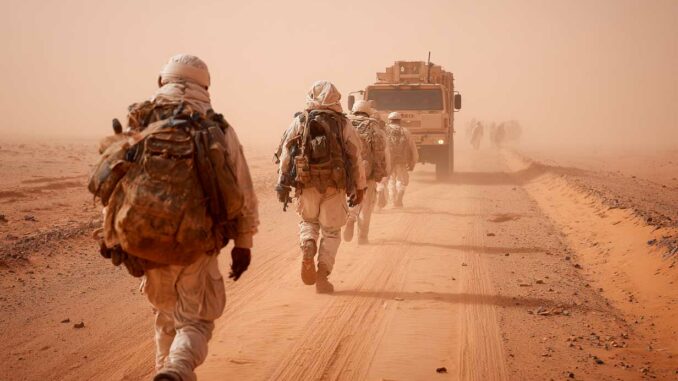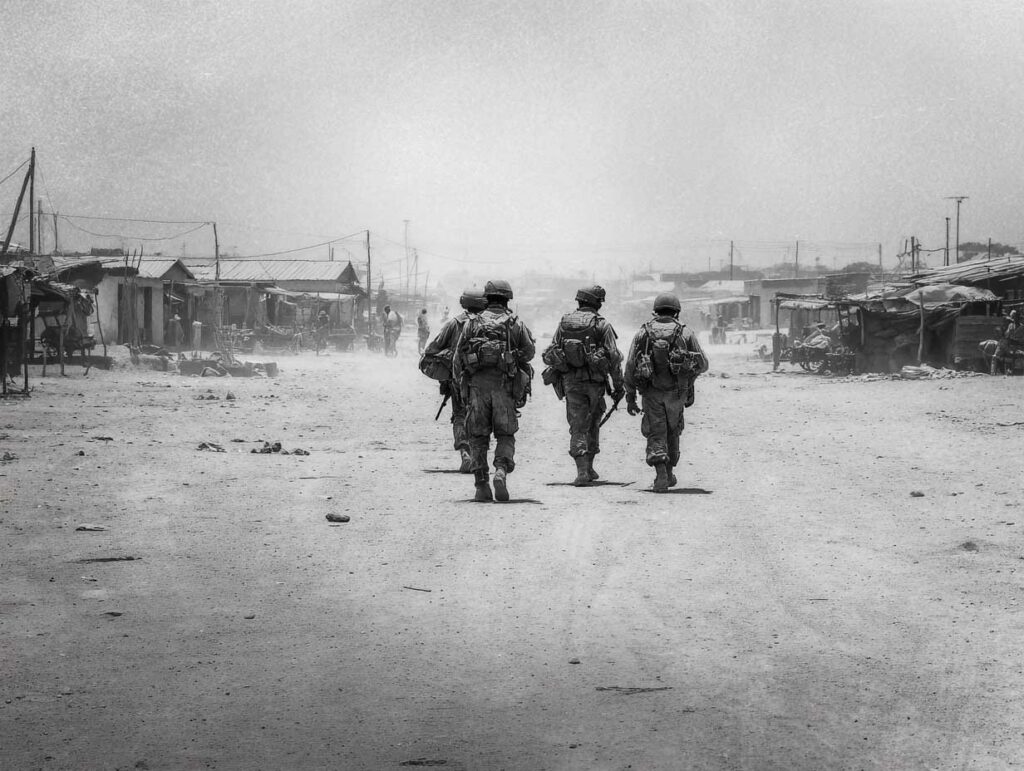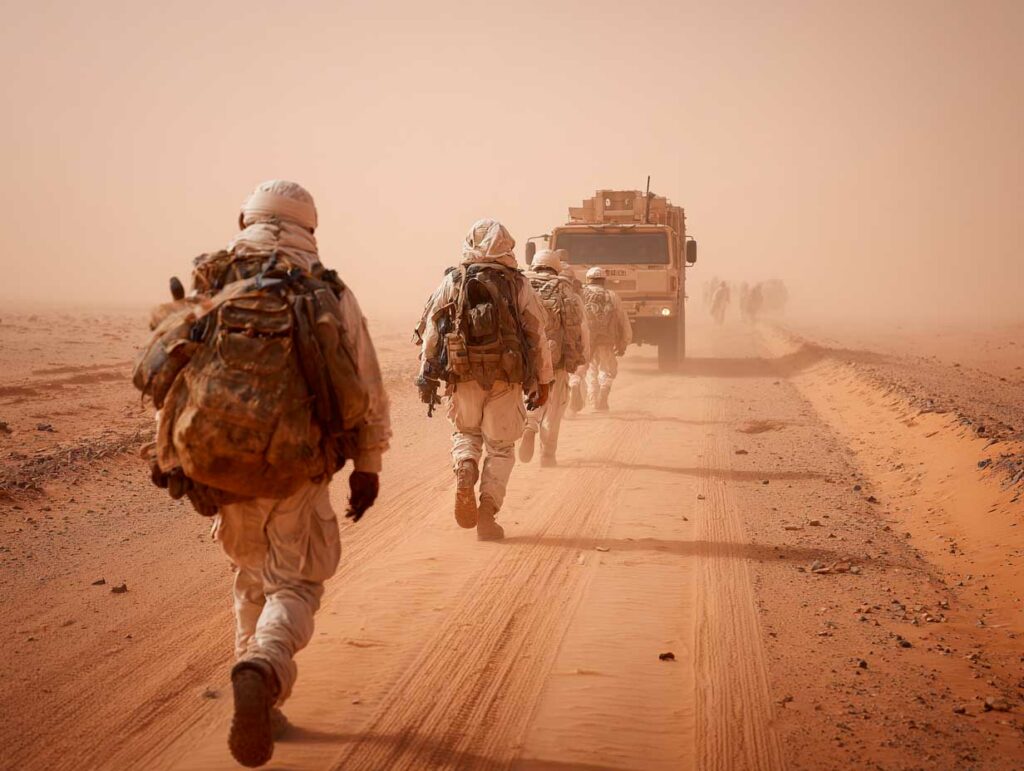
Mali: Africa Corps replaces Wagner. Worrying security situation, Russian influence, and diplomatic tensions.
Summary
In June 2025, the Russian paramilitary group Wagner officially withdrew from Mali. It has been replaced by the Africa Corps, an entity directly attached to the Russian Ministry of Defense. Despite this change, jihadist attacks, particularly by JNIM, continue to multiply, military losses are increasing, and civilian populations are suffering abuses. The transition marks a shift in Russian strategy: fewer aggressive autonomous operations and more training, logistics, and protection of fixed assets. The diplomatic consequences include increased isolation for Mali and internal tensions within its army, exacerbated by a perception of favoritism toward Russian forces.

Wagner’s withdrawal: scope and limitations
On June 6, 2025, Wagner announced the end of its mission in Mali, after more than three years of engagement alongside the Malian Armed Forces (FAMa) to fight jihadist groups. This withdrawal comes as losses suffered by Malian soldiers and Russian mercenaries have recently intensified during attacks by JNIM, particularly in the center of the country.
Wagner claims to have regained control of regional capitals, repelled jihadist leaders, and successfully completed what it called its main missions. But observers point out that insecurity has worsened since its arrival: according to The Sentry report, between 2022 and 2024, the number of jihadist-related deaths averaged 3,135 per year, compared to 736 per year in the previous decade. This increase demonstrates the failure, or the limitations, of a military strategy focused solely on armed force, and reveals the high human cost of regaining control.
The Africa Corps: tactical change and more centralized command
The Africa Corps is presented as the structure replacing Wagner. It is under the direct control of the Russian Ministry of Defense, which changes the nature of operational and political responsibility.
Mission: fewer independent frontal operations, more assistance, training, logistics, and protection of fixed infrastructure. ([Courrier international][4]) Approximately 70-80% of Africa Corps personnel are former Wagner fighters. This human overlap between the two entities blurs the line between withdrawal and simple evolution.
Command: no more formal Russian supervision, subordination to the Ministry of Defense, which could lead to greater accountability, but also bureaucratization that could limit responsiveness in the field.
Security and human rights: persistent challenges
Despite Wagner’s replacement, jihadist attacks continue. The JNIM, affiliated with Al-Qaeda, continues to target military bases and urban centers. Reports indicate an intensification of attacks after Wagner’s arrival, with no notable improvement since the transition to the Africa Corps.
Casualties: Wagner and Malian forces have suffered setbacks. Military bases have been attacked and soldiers killed. One report mentions that several Malian soldiers lost their lives during JNIM offensives and that the civilian population was also severely affected.
Abuses: assassinations, looting, humiliating treatment, arbitrary detentions. Civilian communities—often accused of colluding with jihadists—are targeted. International organizations have denounced serious human rights violations.
Geopolitical and economic impact
Wagner’s official withdrawal serves Moscow politically by consolidating a less visible but more institutionalized presence. The Africa Corps allows Russia to maintain strategic influence in the Sahel, while being more directly responsible for operations and their effects.
Economically, there are unconfirmed rumors that mining concessions (particularly for gold) have been granted in exchange for access and protection provided by Wagner or its replacements. However, The Sentry report points out that the group has not obtained the expected mining concessions, which has limited its real economic influence so far.
Diplomatically, Mali has become increasingly isolated from its Western partners, notably France, the European Union, and the United States. The adoption of the Russian strategy reinforces this isolation, while the Malian government’s credibility on the international stage is undermined, particularly on human rights issues.
Short- and medium-term consequences
In the short term (6-12 months):
- Risk of an increase in jihadist attacks in areas where Malian and Russian forces are less effective. The void left by Wagner in certain aggressive operations could be difficult to fill quickly.
- Rising internal tensions within the Malian army, resentment towards Russian forces—particularly regarding preferential treatment, access to equipment, logistics, or medical evacuation.
- Possible deterioration of civil security, with more internally displaced persons and more civilian casualties due to confusion between civilians and combatants and loss of confidence in the security forces.
In the medium term (1-2 years):
- Institutionalization of Russian influence in Mali: the Africa Corps could become a permanent player, with bases, infrastructure, political ties, and economic contracts.
- Potential increase in foreign investment, but also in risks: mining operations or natural resources could become a lever for Russian political pressure.
- Increased diplomatic risk: stronger sanctions, loss of international aid, possible intervention by international human rights bodies.
- Regional reactions: other Sahel countries (Burkina Faso, Niger) may follow this model of Russian military cooperation, which could redraw alliances in the region.

Critical reflection: ethical and strategic issues
The replacement of Wagner by Africa Corps is not as significant a break as it may seem. Many former Wagner fighters form the core of Africa Corps. The modus operandi on the ground could remain similar, particularly in areas where local chains of command are weak.
One of the major issues concerns accountability. Under Wagner, acts of abuse were often concealed behind the status of a private paramilitary group, allowing for plausible deniability for the Kremlin. With Africa Corps, given its formal dependence on the Russian Ministry of Defense, political and legal responsibility could become more direct. This could pave the way for international investigations, diplomatic pressure, and targeted sanctions.
Another issue concerns operational capabilities. Wagner was renowned for its flexibility, aggressiveness, and independent operations. The Africa Corps, which is more subordinate, may be less effective in rapid actions, in rough terrain, or when facing an asymmetric adversary such as jihadists, who use terrorism, ambushes, and harassment tactics.
A limited but revealing turning point
The move to withdraw Wagner and replace it with the Africa Corps indicates a Russian strategic adaptation: less negative media visibility, more institutional control, and clearer accountability. However, this change does not resolve the underlying problems: weakened security, human rights violations, military losses, diplomatic isolation, and economic uncertainty.
Ultimately, Sahelian Africa remains a testing ground for power politics, and Mali a textbook case of what military and paramilitary transitions can mean when states fail to fully exercise their authority.
War Wings Daily is an independant magazine.